
5 Best HR Software for Small Business (UK Edition)
Running a small business—no matter which part of the world you are— means wearing a lot of hats, and HR is often one of them. Keeping track of time off, handling contracts, and staying up to date on employment laws are just a few of the duties that can quickly use up your day.
HR software helps lighten the load. The right tool can automate admin, keep everything in one place, and make sure you're ticking the correct compliance boxes without hiring a full HR department.
But here’s the catch: many platforms are built for global companies, not UK small businesses. That means they might miss the mark when it comes to UK GDPR, what the ICO says, payroll laws, or local pension rules. Choosing software that’s built for the UK matters—and can help spare you a whole lot of stress down the line.
In this guide, we’ll walk through what to look for in a UK-specific HR tool and share the top options on the market right now.
What Makes Great HR Software for UK SMEs?
For small and growing teams, the best HR software isn’t bloated with enterprise-level features—it focuses on the essentials that actually make a difference day to day. At minimum, that means tools to:
- Store and manage employee records securely
- Track time off, holidays, and absences
- Onboard new hires with minimal friction
- Stay compliant with UK employment regulations
- Support self-service for employees, especially when they need to take time off (to reduce back-and-forth emails)
- Help you write job ads
- Launch a Careers page where you can publish your job searches
- Process all candidates in a single dashboard
Built for the UK: Why Local Matters
UK businesses need software that's built to line up with local laws and practices. That includes:
- UK GDPR and ICO compliant: Securing safe data storage, employee consent, and audit trails.
- Auto-enrolment: Ready to work with pension contributions under UK rules.
- Checks for right to work: Easily monitor the expiration dates of documentation and visa status.
- HMRC integrations: It must work with this if compensation management is included in the solution. If not, it must integrate.
Generic or international platforms often require manual workarounds to stay compliant. UK-focused tools come with these built-in, so you’re not left filling the gaps.
Cloud-Based vs. Desktop Platforms
Modern HR tools are typically cloud-based, which offer access from anywhere—ideal for hybrid or remote setups. Cloud platforms also benefit from automatic updates and backups. When they're SaaS, or software as a service, solutions, they scale as the business scales.
For most UK SMEs, cloud-based HR software offers the flexibility and scalability that matches the way they work today.
5 Best HR Software for Small Businesses in the UK
UK small businesses can make HR processes a lot easier by choosing the right HR software. Below are top-rated platforms particularly suitable to meet the unique needs of SMEs in the UK:
1. TalentHR
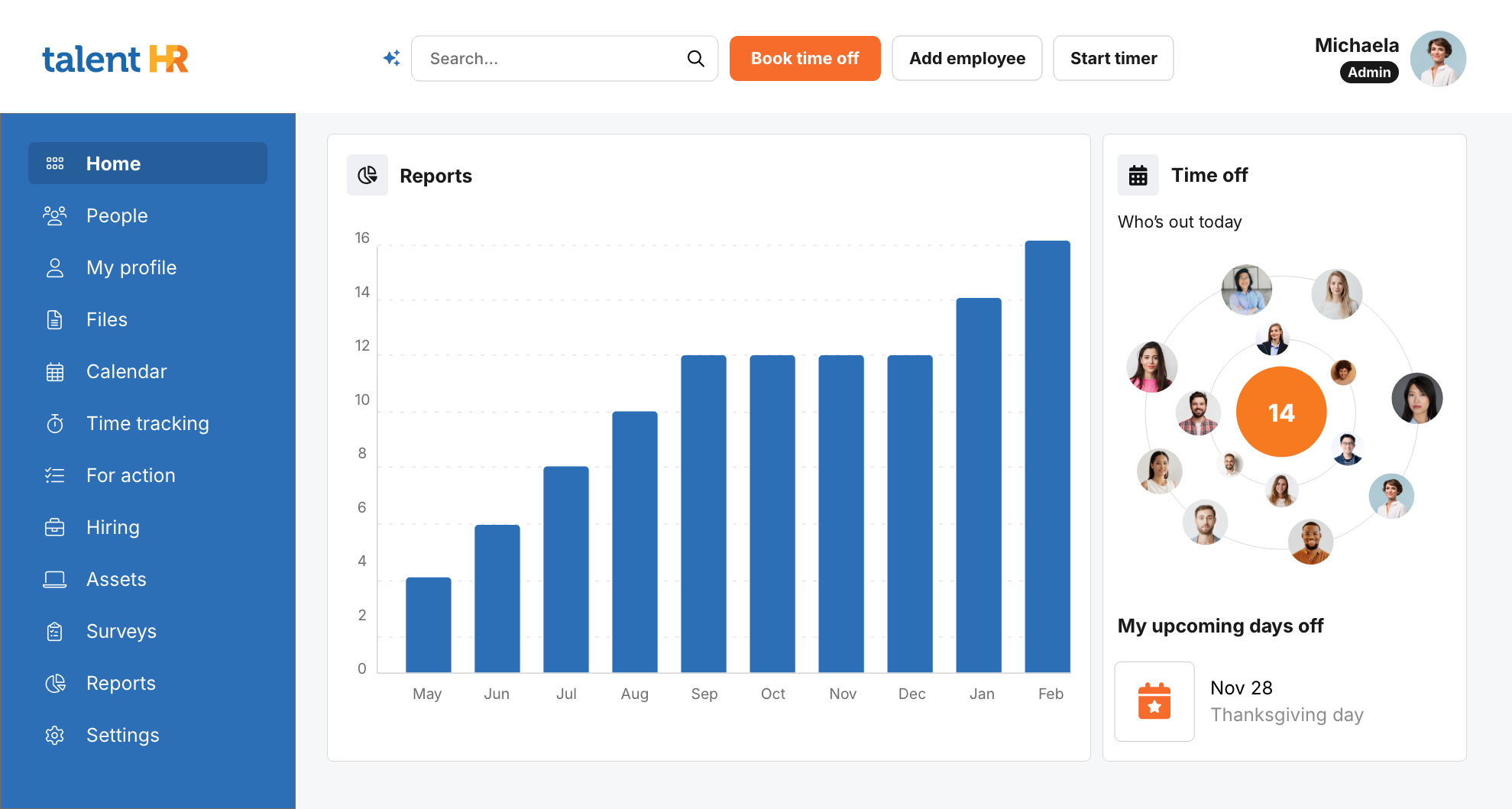
TalentHR is a cloud based, comprehensive HR management software designed specifically for small teams and startups. It helps businesses handle core HR tasks—like onboarding, time-off tracking, performance reviews, and employee data management—all from a single, easy-to-use dashboard.
Most importantly, TalentHR scales. Which means you can start with a free plan and start growing from there, no hidden fees.
The platform comes with a lineup of key features:
- Employee management and performance tracking
- Time-off tracking, time tracking feature, and hiring and applicant management
- Onboarding and offboarding workflows
- People analytics to support data-driven decisions
- Files and e-signatures for paperless documentation
- HR assistant powered by AI for quick answers to policy or admin questions
- Customisations to adapt features to your workflow
- Asset management for tracking equipment and resources
- Mobile app for on-the-go access
- Integrations to connect your HR system with other tools
For UK small businesses, UK GDPR compliance is non-negotiable—and TalentHR handles it well. A great UK startup case study is Morphoses, a London-based ed-tech startup, which adopted TalentHR early on to replace spreadsheets and improve how they managed onboarding, leave, and asset tracking. As their team grew, TalentHR helped centralise sensitive employee data, simplify operations, and support both in-office and remote workers, all while staying compliant with UK data protection laws. HR staff at Morphoses praise the platform’s ease of use, quick setup, and responsive customer support, noting that it made day-to-day HR tasks less manual.
Pricing is one of the most competitive on this list:
- Free: Up to 10 users. You can start here!
- Essential: $2/user/month. At the time we’re writing this, that’s less than £1.50
- Premium: $4/user/month, with a 14-day free trial and added features. That’s less than £3.00 right now.
(Prices are in USD.)
Best for: UK startups and small businesses seeking an affordable, compliant, and modern HR solution that covers the basics without added bloat. And the solution will work once your company grows.
2. Sage HR
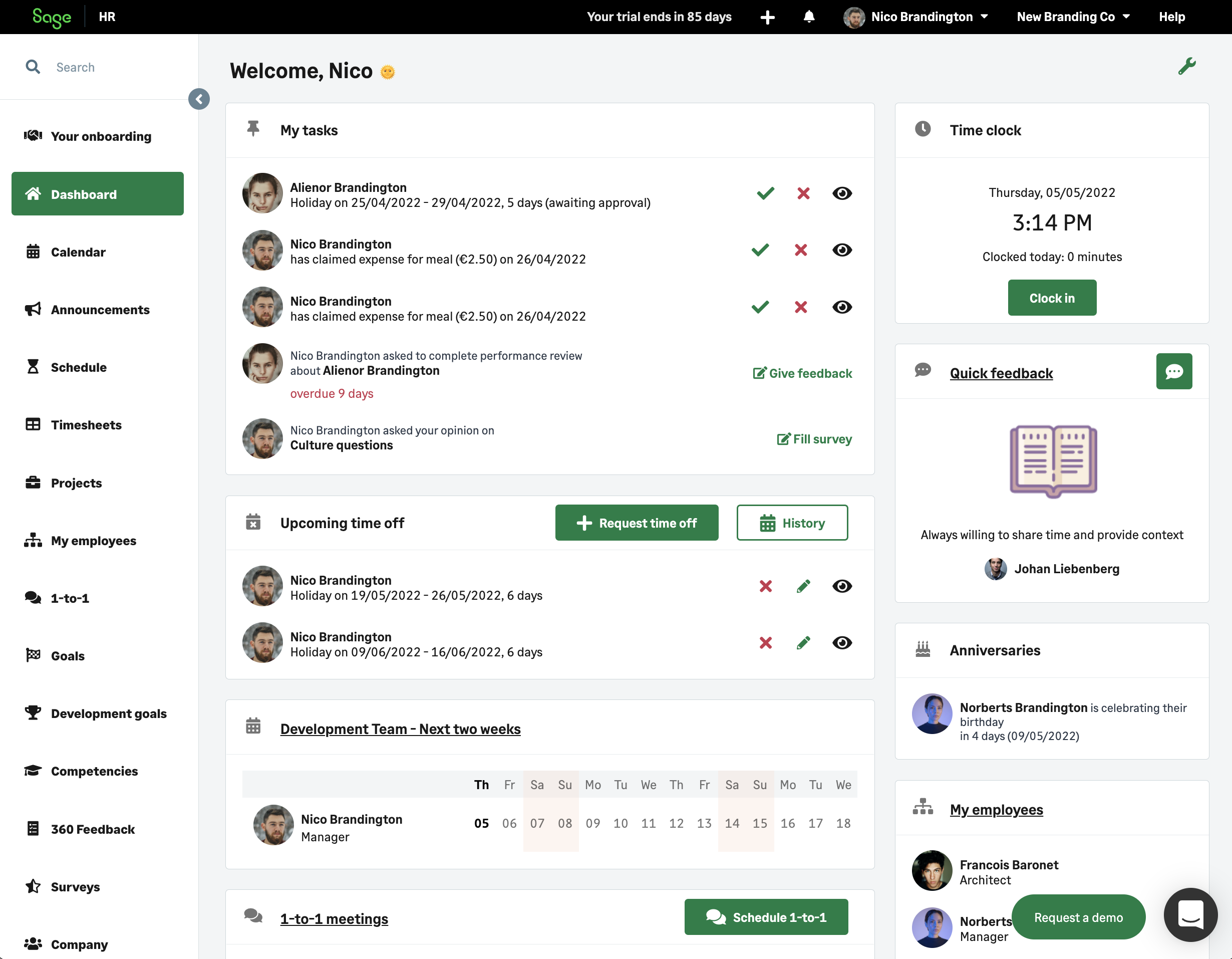
Sage HR is a cloud-based platform that covers a broad range of HR functions for small to mid-sized businesses in the UK. It’s part of the Sage Business Cloud suite and integrates well with Sage’s payroll software and accounting tools, which can be helpful for businesses already using those systems.
The software supports day-to-day tasks like leave and absence tracking, shift scheduling, and performance reviews, and is structured to help businesses stay aligned with UK regulations, including GDPR.
Some of its core features include:
- Time-off management with self-service approval flows
- Shift planning with a visual, drag-and-drop scheduler
- Basic performance tracking
- Document storage
- Mobile access for both managers and employees
Users generally find the interface clean and the system reliable once set up. That said, several reviewers mention that the initial configuration process can be slow, and that reporting and mobile functionality could be more flexible.
There’s no fixed public pricing. Sage HR offers modular pricing based on the features selected and the number of employees. A free trial is available if requested, but you’ll need to contact sales to get a price estimate.
Best suited for: Small UK businesses that already use Sage products or need shift scheduling alongside standard HR features.
3. CharlieHR
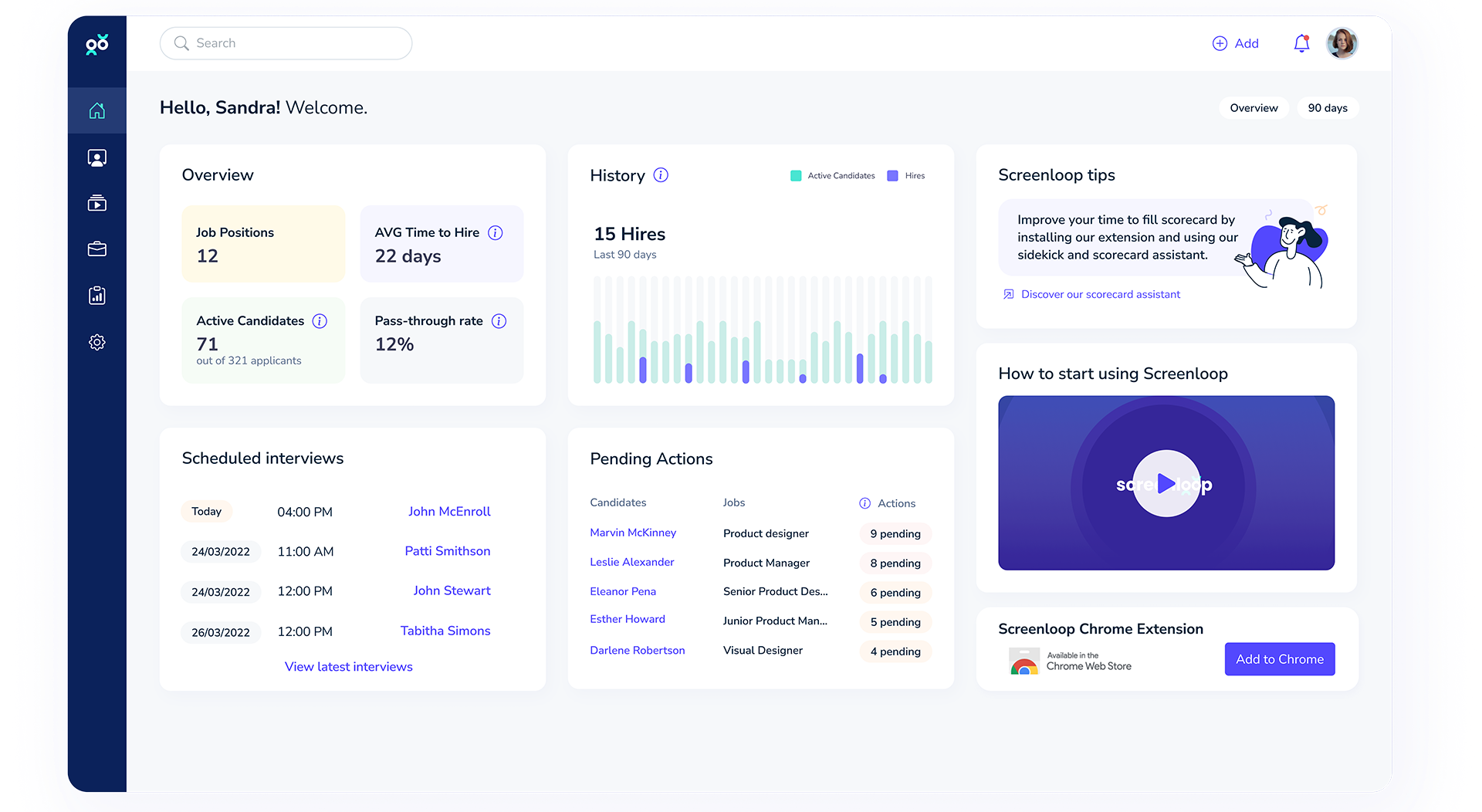
CharlieHR is a UK-focused HR platform designed for small businesses and startups. It offers a clean interface and helps teams handle tasks like onboarding, leave tracking, performance management, and employee record keeping without getting bogged down in unnecessary features. It doesn’t try to do everything, but it does the basics well—and with a clear focus on compliance and ease of use. CharlieHR is fully GDPR-compliant, stores HR data on UK servers, and includes features to help with things like right-to-work checks and document tracking.
Features include:
- Time-off management with Slack integration
- Lightweight performance review tools
- Custom onboarding checklists
- Employee engagement tracking
Users appreciate the platform’s ease of use, the speed at which it can be rolled out, and its clear UI. One reviewer mentioned it helped them get “HR sorted in an afternoon” for a growing team. But some users noted that features like performance reviews and reporting are fairly limited compared to larger platforms.
Pricing starts at £20/month for premium customer support through the Charlie Concierge service. Recruitment tools begin at £55/month, and HR advice and compliance support starts from £179/month.
Best suited for: Early-stage UK startups or small teams looking for an easy, no-fuss HR platform with local compliance baked in.
4. BreatheHR
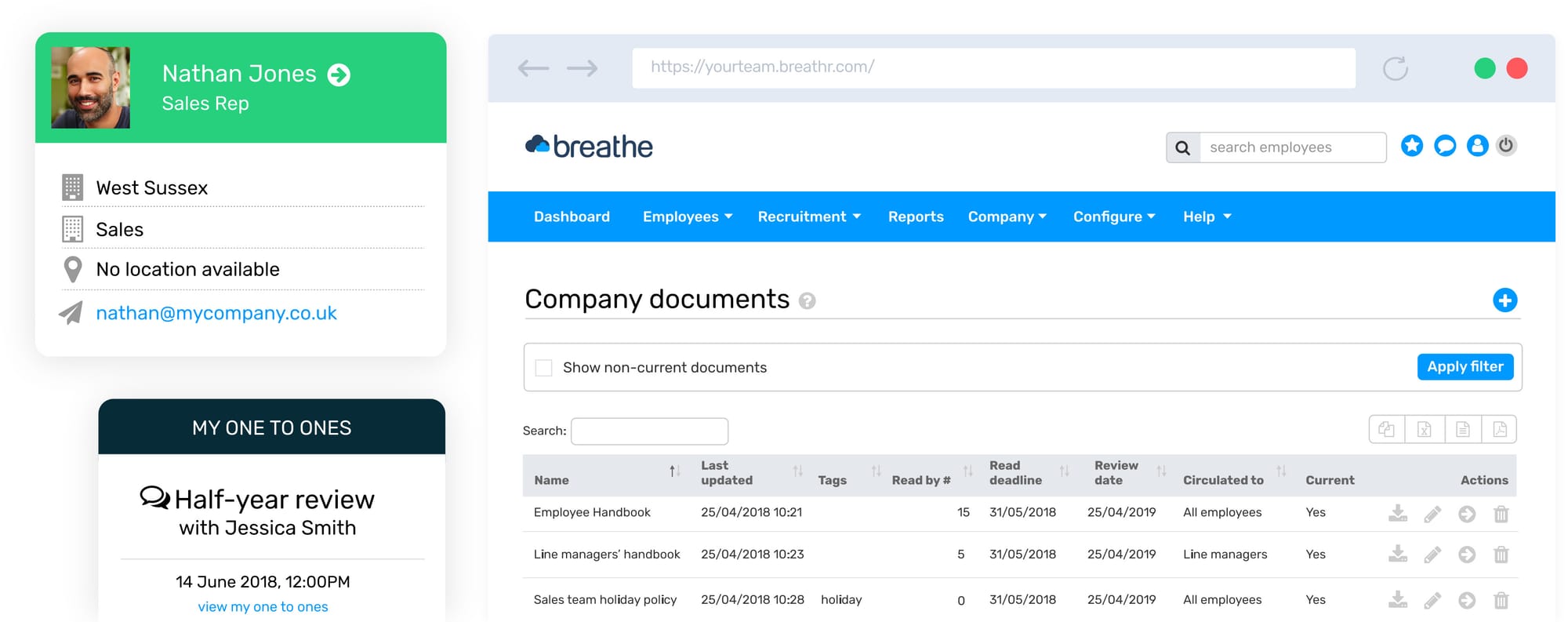
Breathe HR is a UK-based Human Resources software solution designed specifically for small and medium-sized businesses. It helps managers take care of everyday admin tasks like employee records, leave management, performance tracking, and document storage, without the need for a dedicated HR team.
Because it's built for the UK market, Breathe includes features that support GDPR compliance, UK holiday entitlement, and right-to-work documentation. The platform is designed to be accessible for non-HR professionals, with a user-friendly interface and minimal setup requirements.
Core features include:
- Time-off and sickness tracking with calendar views
- Performance management with goal setting and reviews
- Centralised employee records and secure document storage
- Integration with Xero for payroll management
- Optional modules for rota scheduling, recruitment, and expense tracking
Users praises its ease of setup, customer support, and intuitive design. That said, several users also noted that customisation is limited, particularly in reports and permissions. On Reddit, some users note that while Breathe works well for everyday admin, it can become costly if you need extra features and has limited integration options compared to other platforms.
Pricing starts at £22/month per business (for up to 10 employees). This includes core features like time-off tracking, document management, and performance tools. Optional add-ons—such as recruitment tracking (£21), expenses management (£12), and rota planning (£10)—are available at an extra cost.
Best suited for: UK-based SMEs that need a straightforward HR tool to manage time-off, records, and compliance—without overwhelming features.
5. Myhrtoolkit
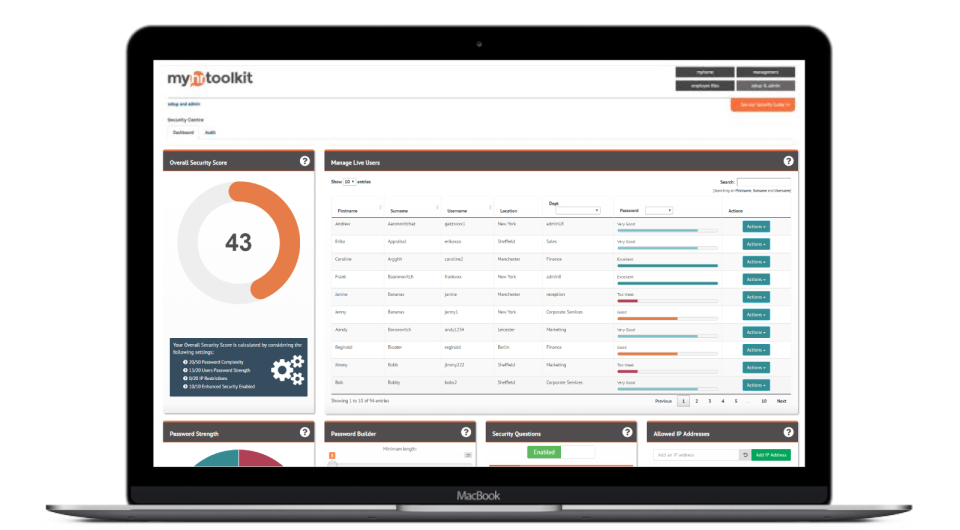
Myhtoolkit is a UK-based HR software system aimed at small and medium-sized businesses that want a structured, compliant way to manage HR tasks. It’s designed for companies that may not have a full-time HR department but still need to stay on top of essentials like leave tracking, document management, and employee records.
The platform helps businesses stay compliant with UK employment law and GDPR, as it offers tools to manage right-to-work documentation, contract access, and data permissions. It’s fully cloud-based, so managers and employees can access it securely from anywhere.
Key capabilities include:
- Annual leave and absence management
- Employee database with role-based permissions
- Reminders for training, appraisals, and expiring documents
- Optional modules for time tracking, asset management, and performance reviews
Users highlight the platform’s simplicity and strong customer support, especially for non-HR professionals. Some users mentioned that while the system is functional and dependable, the interface feels a bit outdated compared to more modern alternatives. Others noted that advanced analytics and deeper integrations are limited.
Pricing is clearly tiered based on employee count, starting at £20.50/month for teams of up to 5 people. All features are included by default—there are no hidden bolt-ons—and plans operate on a rolling monthly contract. A free trial is available, and pricing remains accessible for SMEs, especially those with under 100 staff.
Best suited for: UK businesses looking for a structured, legally compliant HR system with a strong focus on documentation and audit trails.
How to Choose the Right HR Software
Picking the right HR tool doesn’t rely on getting the one with the most features, but on finding what fits your team. Here are a few things to keep in mind.
Focus on What You Actually Need
Start by thinking about the basics: Do you need to track holidays and absences? Do you want help with onboarding or storing employee documents? Are you looking for performance reviews or scheduling?
Stick to the essentials—most small businesses don’t need a complex system. A simple tool that does the basics well is often the best choice.
Think About Budget, Team Size, and Tech Comfort
Consider the following things:
- Budget: Some tools are free for small teams; others charge per user. Make sure you know what’s included and what costs extra.
- Team Size: Small tools can struggle if your team grows fast. Check if it can scale.
- Tech Familiarity: If your team isn’t very technical, choose software that’s easy to use and doesn’t need much setup.
Ask the Right Questions in Demos
When testing a platform or speaking with sales, ask:
- Is it UK GDPR compliant?
- Can I customise things like leave types or roles?
- What’s included in the base price?
- How long does setup take?
- Does it scale so when I grow I can still use this solution?
- Can I see a real example of how a team member would book time off?
Don’t let the demo be all talk—ask to see real tasks in action.
Look at the Experience
Good HR software should be easy to use for both you and your team:
- Is it clean and simple to navigate, even if I don't know nothing about HR?
- Can employees do things like request leave or upload documents themselves?
- Is help easy to find if something goes wrong?
- Is support available during UK hours?
If you can, try a short free trial and get feedback from a few teammates before committing.
HR Software for UK Small Business: Avoid the Bloat, Avoid the High Price Tags, Look for Scalability
HR software for a small business in the UK will work in the extent you find the right fit for your size, needs, and workflow. Don't waste time on the most cutting-edge options if those aren't affordable or don’t scale. The correct tool can save hours every week, cut down on errors, and assist you in living up to UK regulations like what the ICO recommends or even European frameworks like GDPR.
The options in this guide, TalentHR, Sage HR, CharlieHR, Breathe HR, and myhrtoolkit, are all solid choices depending on your priorities. Some are better suited for startups, others for established teams, but all focus on making HR simpler, not harder.
TalentHR is a great option to check out if you're looking for a simple, modern tool designed for growing teams in the UK. You can register now for free.

![3 Best HR Automation Tools to Save Time (And Money) [2025]](/content/images/size/w600/2025/07/3-Best-HR-Automation-Tools--2025-.png)
